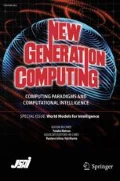Abstract
Although the concept ofknowledge plays a central role in artificial intelligence, the theoretical foundations of knowledge representation currently rest on a very limited conception of what it means for a machine to know a proposition. In the current view, the machine is regarded as knowing a fact if its state either explicitly encodes the fact as a sentence of an interpreted formal language or if such a sentence can be derived from other encoded sentences according to the rules of an appropriate logical system. We contrast this conception, the interpreted-symbolic-structure approach, with another, the situated-automata approach, which seeks to analyze knowledge in terms of relations between the state of a machine and the state of its environment over time using logic as a metalanguage in which the analysis is carried out.
Similar content being viewed by others
References
Barwise, Jon and Perry, John,Situations and Attitudes. MIT Press, Cambridge, Massachusetts, 1983.
Brady, J. Michael (ed.),Computer Vision, North Holland Publishing Company, Amsterdam, The Netherlands, 1981.
Dennett, Daniel C,Brainstorms, Bradford Books, Cambridge, Massachusetts, 1978.
Fodor, Jerry A,The Language of Thought, Thomas Y. Crowell Company, New York, 1975.
Halpern, Joseph and Moses, Y. O., “Knowledge and common knowledge in a distributed environment,”Proceedings of the 3rd ACM Conference on Principles of Distributed Computing, pp. 50–61, 1984; a revised version appears as IBM RJ 4421, 1984.
Harel, David.First Order Dynamic Logic (Lecture Notes in Computer Science, Vol. 68), Springer-Verlag, 1978.
Hayes, Patrick, “In Defence of Logic,”Proceedings of the Seventh International Joint Conference on Artificial Intelligence, Vancouver, B. C., pp. 559–565, 1981.
Hintikka, J.,Knowledge and Belief, Cornell University Press, Ithaca, 1962.
Hughes, G. E. and Cresswell, M. J.,An Introduction to Modal Logic, Methuen and Co. Ltd., London, 1968.
Konologe, Kurt, “A Deduction Model of Belief and its Logics,”Technical Note, No. 326, Artificial Intelligence Center, SRI International, Menlo Park, CA, August, 1984.
Kripke, Paul, “Semantical Analysis of Modal Logic,”Zeitschrift für Mathematische Logik und Grundlagen der Mathematik, 9, pp. 67–96, 1963.
Levesque, Hector J., “A Logic of Implicit and Explicit Belief,”Proceedings of the National Conference on Artificial Intelligence, pp. 198–202, 1984.
Marr, David,Vision, W. H. Freeman and Company, San Francisco, California, 1982.
Moore, Robert C., “A Formal Theory of Knowledge and Action,” inFormal Theories of the Commonsense World (Jerry R. Hobbs and Robert C. Moore eds.), Ablex Publishing Company, Norwood, New Jersey, 1985.
Nilsson, Nils J., “Shakey the Robot,”Technical Note, No. 323, Artificial Intelligence Center, SRI International, Menlo Park, CA, April, 1984.
Pratt, Vaughan R., “Semantical Considerations on Floyd-Hoare Logic,”Proceedings of the 17th IEEE Symposium on Foundations of Computer Science, pp. 109–121, October, 1976.
Rosenschein, Stanley J., “Plan Synthesis: A Logical Perspective,”Proceeding of the Seventh International Joint Conference on Artificial Intelligence, Vancouver, B. C., pp. 331–337, 1981.
Author information
Authors and Affiliations
Additional information
This work was supported in part by a gift from the Systems Development Foundation and in part by FMC Corporation under Contract 147466 (SRI Project 7390).
About this article
Cite this article
Rosenschein, S.J. Formal theories of knowledge in AI and robotics. NGCO 3, 345–357 (1985). https://doi.org/10.1007/BF03037076
Received:
Issue Date:
DOI: https://doi.org/10.1007/BF03037076




